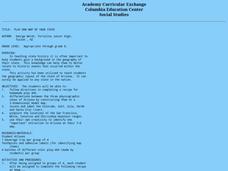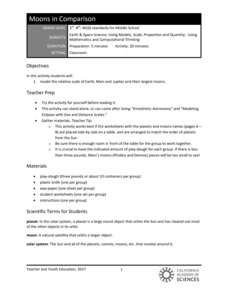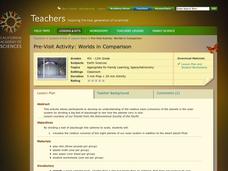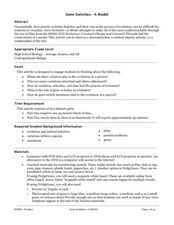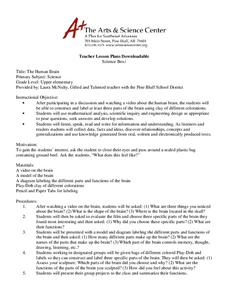Pingry School
The Gelation of Guar Gum with Borax
Some of kids' favorite toys are the products of science experiments. Scholars follow precise measurements to mix and create their own slime and Play-Doh. They observe the changing textures and the chemical reactions throughout the...
Curated OER
Activity Plan Mixed Ages: Exploring Play Dough
Students learn to prepare a play dough recipe in order to enhance their measurement, reading, and creative-thinking skills. In this lesson plan on making play dough, students measure and add the different ingredients, while...
Curated OER
Ready, Set, Let's Dough! It's a Matter of System
Students explore physical sciences by participating in a class experiment. In this matter lesson, students identify the three forms of matter and their physical differences. Students utilize cookie dough to create a play dough like...
Curated OER
Play Doh Map of Your State
Learners create a state map using Playdoh. In this hands-on state geography lesson, students work in groups to form a three-dimensional map of their state using Playdoh made at home following a (given) recipe. Learners use four...
DiscoverE
Squishy Circuits
Make electricity flow through Play-Doh. Individuals create animals or other creatures using Play-Doh. The engineering aspect? Eyes that light up and Play-Doh that conducts electricity.
Curated OER
Modeling the Electromagnetic Spectrum
Learners construct a model of an electromagnetic spectrum using play-doh and string. They use exponents and plot the radio/microwave, infrared, and visible bandwidths of the spectrum.
California Academy of Science
Moons in Comparison
Just how big is Earth's moon? With a hands-on simulation, scholars use Play-Doh to model the sizes of the planets Earth, Mars, Jupiter, and their moons. They make predictions as a class, work together to make their models, and discuss...
Alabama Learning Exchange
Learning the Three Layers
Students examine the Earth's crust or lithosphere, mantle and core. They complete research using assigned web sites before designing a model of the Earth using items such as Play-Doh, peaches and apples.
Pacific Science Center
Worlds in Comparison
Young astronomers follow a step-by-step procedure for dividing a lump of dough into parts, resulting in a scaled volume set of puny planets. Along with the printable directions is a template chart of planet names on which learners can...
Curated OER
Fabulous Fossils
Young scholars investigate how fossils are formed. They read the book, "Digging Up Dinosaurs," examine fossil samples, create a fossil imprint using play-doh, and complete a Fossil Questionnaire activity sheet.
Curated OER
Build an Anchialine Pond
Students explore biology by conducting a nature experiment. In this pond examination lesson, students utilize recycled materials, play-doh and water to recreate a pond and its inhabitants. Students identify the different elements within...
Science 4 Inquiry
Genetics, Genetics, and More Genetics: Exploring Independent Assortment and Non-Mendelian Genetics
Two individuals share 99.9 percent of their genetic codes, yet diversity is observed everywhere. Young scientists learn about diversity through hands-on activities and an experiment. They apply the concepts of independent assortment and...
K-State Research and Extensions
The Crusty Earth
Geology rocks — literally! A geology chapter offers eleven activities at four different levels. Scholars enjoy completing hands-on experiments before applying critical thinking skills following a share, process, generalize, apply,...
Curated OER
Levels of Organization
Students brainstorm a list of all the functions organisms carry out and how they carry them out. In groups, they are given the smallest and highest level of organization in organisms and are to fill in the missing spaces. To end the...
Curated OER
Atoms and Elements: An Introduction
Students are able to discuss the difference between a proton, a neutron and an electron. They also can explain the difference between an ionic and a covalent bond. Students know the main structure of atoms and molecules. Student are able...
Curated OER
Creating Animal Prints
Students investigate the habits of animals by studying their prints. In this animal life lesson, students investigate the different types of tracks left from animals by researching the Internet. Students utilize clay or...
Curated OER
Yellow Pod
Young scholars use appropriate skills to design and conduct scientific investigation. They sort and classify various ingredients and analyze their investigation. Finally, students describe the observable states of matter, bot solids and...
Center for Learning in Action
Introducing Physical and Chemical Changes
Young scientists investigate chemical and physical changes to the states of matter—gas, liquid, and solid—as well as solutions and suspensions with a variety of demonstrations, grand conversation, and an interactive quiz to check for...
Curated OER
Structural Geology Laboratory
Students explore modeling of geologic structures in experiments. They study how compressive and tensile forces produce these structures. The compression makes the flatlying strata shorter and tension make the strata longer.
Curated OER
Industrial Processes of Polymers: How toys Are Made
Students explore how technology and science have created the plastics that make toys. In this industrial processes lesson students work on their own injected molded product and a blow molded product.
Curated OER
Balloon Lungs
Students study the function of lungs. In this lung function lesson, students complete an experiment using balloons to study the way lungs work. Students study a diagram of their lungs and make a hypothesis for their lung capacity...
NorthEast Ohio Geoscience Education Outreach
Investigation of Plate Boundaries
Demonstrate the movement of lithospheric plates due to convection in Earth's mantle. Learners then model the movements that occur along plate boundaries using colored clay.
Curated OER
Gene Switches- A Model
Students explore genetic variation within a population. In this genetic adaptation instructional activity, students investigate the reasons contributing to genetic adaptation. Students collaborate and analyze DNA models. Multiple...
Curated OER
The Human Brain
Students identify parts of the human brain. In this biology lesson, students watch a video about the human brain. Students use different colors of clay to construct and label the three parts of the brain.



